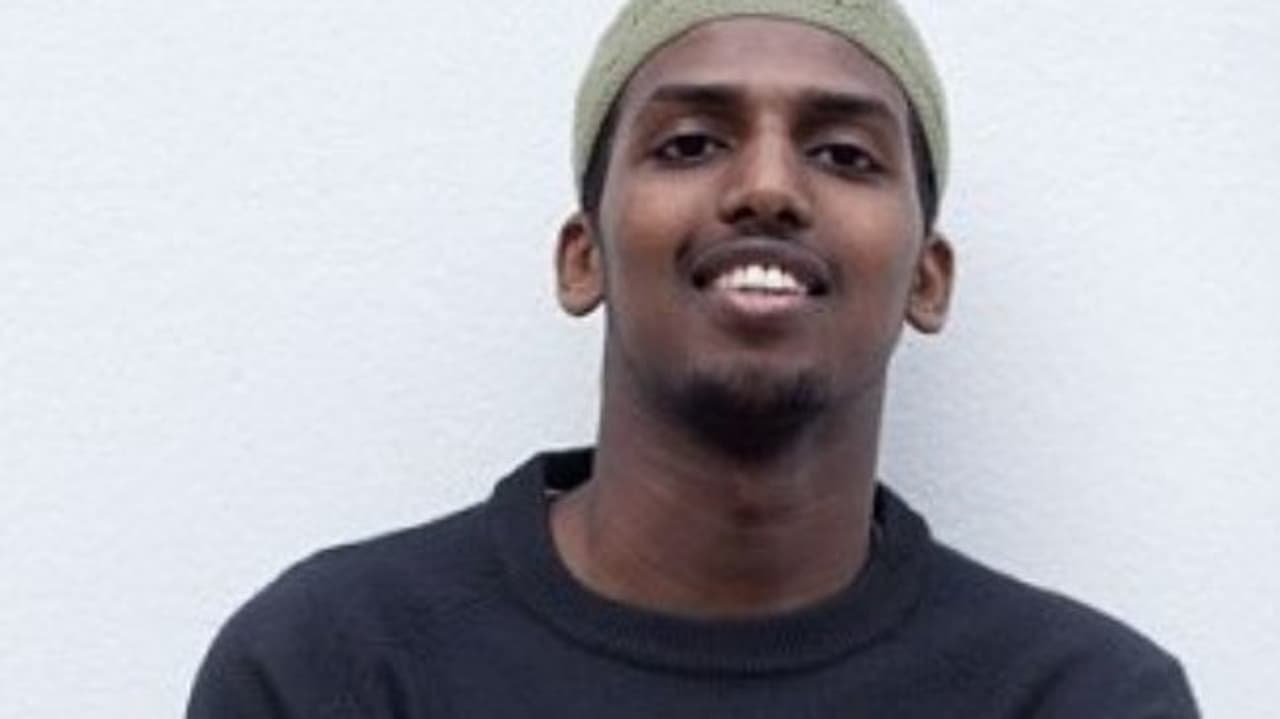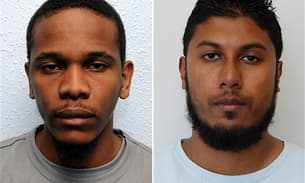
Stripped of his UK citizenship, now Mahdi Hashi is in solitary confinement in New York
Mahdi Hashi is currently in the middle of New York City, completely cut off from the world.
For up to 23 hours a day, the 24-year-old prisoner is locked in his cell in the federal government’s Manhattan Correctional Facility — also known as ‘Little Gitmo’. Sometimes he can hear fellow inmates praying; for a while, he was kept near Sulaiman Abu Ghaith, Osama bin Laden’s son-in-law, who was convicted last month on terrorism charges.
Once a month, Hashi is allowed a brief phone call to his parents. In February he was allowed to phone his wife — it was the first time they had spoken since he fled their home in Somalia in 2012 after learning that his British citizenship had been revoked, and with it all the protections extended to UK citizens.
Read the Bureau’s full investigation: Citizenship Revoked
Aside from his guards, the only people Hashi has contact with are his lawyers, who have had to sign strict gag orders preventing them from discussing even the most basic details of his case. It was recently revealed that Hashi’s trial won’t begin until February 2015, at the earliest.
By that time he will have spent more than two years in isolation at a maximum-security jail, in conditions that have been described as ‘coercive’ and ‘unacceptable’ by the UN special rapporteur on torture, Juan Mendez.
‘[Solitary confinement] in pre-trial detention is particularly objectionable because the pain and suffering of a mental or psychological nature that the person suffers prepares him psychologically to either confess or make statements against his interests, or even plead guilty,’ Mendez told us. ‘It seems to me that in terrorism cases, at least, that’s a very deliberate policy of the United States.’
* * *
Hashi was singled out by the UK Home Secretary as one of a small but growing number of men to lose their citizenship under counter-terrorism laws that have been compared by a leading human rights lawyer to ‘medieval exile’.
Hashi arrived in the UK with his family as a five-year-old after they fled the civil war in their native Somalia and claimed asylum. At the age of 14, Hashi became a British citizen.
At 16, after finishing his GCSE exams, Hashi moved to Egypt to study Arabic; several other men from his social group in London had traveled to Egypt as well, though Hashi was the youngest by several years. During the trip, he was detained by authorities and accused of associating with Muslim extremists, a charge that Hashi repeatedly denied. He was deported to the UK, and from that point on he claimed he was being harassed by the British intelligence services.
In May 2009, he and four other young Muslim men went public, telling the Independent that they were being pressured to spy for MI5, Britain’s domestic intelligence agency. One of the men, Mohamed Nur, says he was told by an MI5 agent, ‘If you do not work for us, we will tell any foreign country you try to travel to that you are a suspected terrorist.’
In a complaint he wrote that October to the spy services’ regulators, Hashi claimed he was repeatedly approached and asked to work as an informant. He described being detained for hours at airports and contacted in the UK by members of MI5.
‘I myself am sick and tired of this cycle of savage harassment for the last three years to the point where they are making me a terror suspect,’ he wrote. ‘What have I done to deserve this and to be wanted and known as a dangerous terrorist. It looks like there is no way out.’
Hashi was 19 at the time the Independent article was published. ‘I think it’s because my son was a practising Muslim,’ Hashi’s father says. ‘From his childhood, he never got involved with drugs like other Somali children. I think they thought he was in a good position for them to use him against Muslims to get them more information for the war on terror. But when he said no to them, they said, “If you don’t work for us, you’re against us.”‘
Not long after the Independent article was published, Hashi returned to Somalia. Mohamed says his son went to care for his grandmother, who was in her 90s. But Hashi ended up moving into her home on the outskirts of Mogadishu, getting married, and having a son. It’s not clear whether he’d originally planned to settle down there, whether something convinced him to do so after he arrived in Somalia, or whether the alleged MI5 harassment played a role in his decision.
* * *
At about the same time, two men a few years older than Hashi also left London and headed for Africa: Mohamed Sakr, who was born in London to Egyptian-British parents, and Bilal al Berjawi, who was born in Lebanon and came to Britain as a baby. Both men had been of interest to MI5 at least since being deported from Kenya on suspicion of terrorism earlier that year, and possibly before. It’s not clear how well they knew Hashi, but the men all had several acquaintances in common.
In the fall of 2010, UK Home Secretary Theresa May took a step that at the time was highly unusual. She revoked the British citizenship of Sakr and Berjawi by employing little-used powers in the British Nationality Act that allowed her to revoke citizenship if she decided that an individual’s presence in the UK was ‘not conducive to the public good.’
By early 2012, the two men were dead, killed in two separate US drone strikes in Somalia.
Related story – Parents of British man killed by US drone blame UK government
There is little doubt that Sakr and Berjawi were militants; a video posted on jihadi sites after their death shows them posing with weapons in Somalia. Although they were widely reported as belonging to the Somali rebel group al Shabaab, an obituary of Berjawi published on jihadi sites links him to senior members of al Qaeda in East Africa.
Hashi’s former US lawyer Harry Batchelder told the Bureau last year that Hashi had made contact with Sakr and Berjawi in Somalia. According to Batchelder, Hashi was ‘very close to [Berjawi]’ but ‘had very little to do with anything.’ Batchelder wouldn’t elaborate on that seeming contradiction. Hashi’s father says he believes his son met Berjawi ‘once or twice.’
After Berjawi’s death, al Shabaab rounded up a number of Westerners on suspicion of spying for the Americans — including Hashi. He was held for months, and at one point al Shabaab announced he would be executed. But instead, he was freed in early summer along with two Somali-Swedes; one of their brothers had asked a Somali MP to put pressure on al Shabaab to release the trio.
That June, Hashi’s father received a letter, delivered by hand to his London home. A phone call from a government official urged him to pass on the letter’s message to his son: Like Sakr and Berjawi before him, Hashi had lost his citizenship. He had 28 days to lodge an appeal.
‘The reason for this decision is that the Security Service assess that you have been involved in Islamist extremism and present a risk to the national security of the United Kingdom due to your extremist activities,’ the letter read. It was signed by the Home Secretary.
Hashi’s parents managed a brief phone call during which they told him of the loss of his citizenship. With no British embassy in Somalia at the time, he would have to leave the country to appeal.
Not long afterward, Hashi was detained by authorities in Djibouti. He later said he was trying to get to Saudi Arabia to lodge an appeal; the US government alleges he was on his way to Yemen. He was held in secret in Djibouti for months, and told Batchelder and his father that he heard fellow prisoners being tortured — and that he was threatened with the same.
Related story – British-Somali man’s family fear US is secretly holding him
When a fellow inmate was released, that man contacted Hashi’s family and told them their son was being detained. The family contacted the British Foreign Office, who, according to Hashi’s father, told them that his son was ‘no longer a British national, and as such has no right to receive Consular assistance.’
In December 2012, Mohamed Hashi said he was convinced the US was implicated in his son’s detention. He was quickly proven correct. The Friday before Christmas 2012, Hashi reappeared thousands of miles away from Djibouti in a Manhattan courtroom. Alongside him were the two Somali-Swedes with whom he had escaped al Shabaab. The men had been hooded, put on a flight to New York with no extradition process, and held in secret detention in Manhattan for more than five weeks. They were accused, amongst other things, of participating in ‘an elite al Shabaab suicide bomber program’.
* * *
Hashi had become part of an emerging trend in US counter-terrorism. Over the past three years, a series of terrorism suspects have been quietly brought to New York from around the world to face jury trials instead of military tribunals; Abu Ghaith is the highest-profile of them to date.
Related story – European terrorism suspects secretly held in New York under false names
If convicted, Hashi faces a mandatory minimum sentence of 30 years in prison, and a maximum of life. A previous attorney urged Hashi to plead guilty in return for a 35-year sentence.
In a 2011 report to the UN General Assembly on the use of solitary confinement worldwide, Mendez drew attention to the psychological harm that the practice wreaks on inmates. ‘Solitary confinement reduces meaningful social contact to an absolute minimum. The level of social stimulus that results is insufficient for the individual to remain in a reasonable state of mental health.’
Without human contact, he wrote, ‘individuals soon become incapable of maintaining an adequate state of alertness and attention to their environment. Indeed, even a few days of solitary confinement will shift an individual’s brain activity towards an abnormal pattern characteristic of stupor and delirium.’
In the case of Hashi and his co-defendants, the government has repeatedly filed exclusions to ‘speedy trial time’ laws, which stipulate that a defendant should face trial within 70 days of being incarcerated.
‘I’ve seen cases in which people are held in solitary confinement for three or four years, and then they either go to trial or they plead [guilty] — mostly, they plead,’ Mendez said. ‘And it seems to me that’s a coercive practice; it violates not only the right to be free from cruel, inhuman, and degrading treatment, but also due-process rights in trial.’
Mohamed Hashi tells us that his son has been ‘under pressure’ to plead guilty.
‘It’s like they want to demoralize him,’ his father says. ‘If you’re left locked in a room, 23 hours a day, knowing nothing about what’s going on, obviously you will give up, life will have no meaning to you.’
A spokesman for the Federal Bureau of Prisons said: ‘While I can’t comment on the conditions of confinement for a particular inmate, I can tell you that the conditions imposed in a particular case are dictated by the inmate’s unique safety and security needs.’ The Department of Justice did not respond to a request for comment.
When he speaks to his son during a brief monthly phone call that he believes is actively monitored, Mohamed says his son is in ‘high spirits’. But he fears for Mahdi’s wellbeing. ‘Sometimes I’m afraid he might go mental.’
Mohamed believes that his son’s incarceration alongside such high-profile suspects as Abu Hamza and Abu Ghaith is part of a tactic to change perception of him. ‘They want to convince everybody that this young boy is a big terrorist.’
Mendez says that even if Hashi is eventually convicted as a terrorist, conditions such as the ones the 24-year-old currently faces are a breach of his human rights. ‘We don’t recognise the [human] rights of … only those people who we think are OK. We have to recognise them even of our own worst enemies,’ he says. ‘And so it’s appropriate to arrest them, to hold them, to try them, and to give them very long sentences for what they have done. But it’s not appropriate to deprive them of basic, fundamental rights.’
This story also appeared on Vice News
Follow Alice Ross on Twitter. Sign up for email updates on the Citizenship Revoked investigation.




